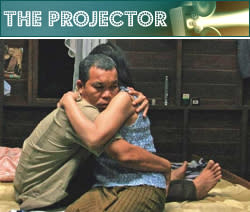Review: ‘Uncle Boonmee Who Can Recall His Past Lives’

Because he knows his name is a mouthful for foreigners, Thai filmmaker Apichatpong Weerasethakul allows Westerners to just call him Joe, a charming, low-key moniker for a guy whose movies are both mysterious and oddly inviting. His most recent, "Uncle Boonmee Who Can Recall His Past Lives," won the Palme d'Or at Cannes last year and has been described by some as his most accessible film. In some ways that might be true, but the director's fans shouldn't worry: There is plenty that is still wonderfully baffling about his latest magical concoction.
The plot, for a lack of a better way to describe it, is rather straightforward: Boonmee (Thanapat Saisaymar) is a middle-aged man dying of kidney failure who has decided that he'd like to retreat to the countryside to live out what little life he has left. But his time with his sister-in-law is interrupted by ghosts and strange creatures who represent family members who have died or gone missing.
In his past films, like "Syndromes and a Century" and "Tropical Malady," Weerasethakul has played around with conventional three-act structure while at the same time telling stories that nonchalantly move from love stories to fables to almost science fiction. (In his film "Blissfully Yours," the opening credits don't show up until more than a half hour into the movie.) World cinema is filled with ponderous auteurs who like to subject their audience to intentionally antagonistic gambits, but Weerasethakul's films have never felt "difficult" in that way: They have a light touch that makes even their most experimental flourishes seem like fun adventures we're going on with him. We share in his sense of excitement, and so we happily follow him whichever direction he travels.
This is a crucial component in his appeal because "Uncle Boonmee" is a movie that, even after seeing it twice, defies easy categorization. For example, even the film's title is misleading since we never do find out what other creatures or characters we meet in the movie are, in fact, his past lives. The answer is that we're not supposed to know: The wondering is the point. Likewise, there are at least two sections of the film that seem to be happening outside the Boonmee story that may or may not be connected to the dying man's life. Weerasethakul wants to leave these questions open-ended because "Uncle Boonmee" is really about the uncertainty that surrounds dying, which is something that Boonmee and those closest to him grapple with during the movie. Consequently, this is an unavoidably poignant, gentle film about just how little we really understand about the big mysteries of life.
In the time since the film premiered last May in Cannes, "Uncle Boonmee" has gained attention for its more outlandish moments, which I don't want to reveal here just in case you haven't found out about them online. One reason is that I don't like giving away spoilers, but also I think that the attention given to these brief moments distracts from the movie's overall tone and spirit, which is more meditative than it is shocking. And besides, the emphasis on these moments distracts from the movie's much more genuinely startling sequence, which is its ending. In a movie about reincarnation and the flimsy barrier between the living and the dead, "Uncle Boonmee" arrives at a conclusion that I couldn't even begin to pretend to understand. But I think that's what Weerasethakul wants. In our daily lives, we demand certainity, which is why mortality scares us: We don't know what lies beyond this world and we're not sure if we want to find out. Movies will sometimes try to answer those questions with grand visuals about what the afterworld might look like, but Weerasethakul doesn't do that. With "Uncle Boonmee," he basically says that he doesn't know either and that we should embrace that. He makes uncertainty seem very, very comforting.
Grade: A-

